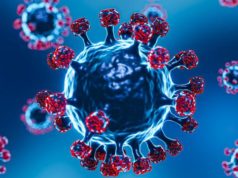[Column written by Dr. Annabel Fountain]
There are multiple conditions that are associated with elevated steroid levels either through treatment or the body making excess steroids from the adrenal glands. This article is to bring awareness that if you’re on steroids your immune system may not cope as well as others if you come into contact with Covid-19.
Chronic elevations in steroid levels change the metabolism and are associated with weight gain, elevated blood glucose and high blood pressure. In fact, steroids can cause diabetes! They can also cause problems with the immune system and people with high steroid levels are more susceptible to infections. People with chronically high steroid levels are therefore at higher risk of complications if they get Covid-19 or any infection.
Cortisol is the main steroid that your body makes naturally. There are many other steroid hormones that your body makes but this is the one that gets you out of bed in the morning. Normally, it is low at night when you go to sleep and starts rising about 3am so that your blood pressure can support you standing up.
You’ve probably heard of hydrocortisone, prednisone, prednisolone, dexamethasone, betamethasone. These are all steroids given as medications to reduce inflammation. Inflammation is part of the body’s natural immune response. If someone is on steroids for a prolonged period of time, this can actually impair their immune system making them less able to fight infections that may come along. Conditions that are often treated with steroids include asthma, chronic lung disease [either as inhalers or pills], lupus, rheumatoid arthritis, eczema and other chronic skin conditions and many others. Many of these people take other medications to control their disease which may also affect their immunity. This group of people are often recommended to have a flu shot because of their susceptibility to worse infections. We describe this group as immunocompromised.
Addison’s disease is a condition where the adrenal glands fail and no longer make the natural cortisol that is needed to maintain blood pressure. This group of people take a small amount of steroids either as hydrocortisone or prednisone pills every day as hormone replacement therapy [like someone who’s pancreas doesn’t work takes insulin or someone who’s thyroid doesn’t work takes thyroxine – Synthroid or similar]. The dose of steroids that people with Addison’s disease takes is just enough and is not going to have an effect on their immunity. They can’t ever stop their steroids because they become very sick without them.
In healthy people, if they’re under stress of any kind [illness, work stress, surgery or an accident, for example], the adrenal glands make more cortisol to help to get through the stress. This is part of the “fight or flight response”, along with adrenaline that you’ll remember from science in high school. If someone is on treatment with steroids for a long time, their adrenal glands sometimes “forget” how to make extra cortisol. This means that their response to stress can be impaired and the dose of steroids may need to be increased. We ask people who take steroid medications to wear a medicAlert tag so that any health care provider is warned that they may need to be given additional steroids in an emergency.
Sick Day Rules For People Taking Steroids:
Some conditions need you to double your normal daily dose:
- Fever of more than 37.5C or 99.5F
- Diarrhoea lasting more than 24 hours
- Surgery – discuss with your surgeon and anaesthetist before your operation
Emergencies that need steroids to be given via injection:
- Severe vomiting
- Haemorrhage
Gradually reduce your steroid dose back down to your normal requirement when you’re feeling better.
There’s another condition that’s associated with having too much steroids for a long time. It’s called Cushing’s syndrome. This can be caused either by your body making too much cortisol from the adrenal glands or because you’ve been on high doses frequently for an inflammatory condition as discussed above. These people often have diabetes and hypertension and they find it very difficult to lose weight, and they can have frequent infections.
If you have diabetes or are at risk for diabetes, monitor your sugars more when taking steroids to make sure they’re not getting out of control and talk to your doctor if you’re worried. This shouldn’t stop you taking steroids if your doctor has prescribed them. You may need an increase in your diabetes medication or it may need to be changed. If the steroids have been prescribed for a short period of time, your blood sugar levels will usually go back to normal when you stop taking them.
All of the conditions mentioned here are associated with reduced immunity and problems dealing with infections. Anyone who is on long term steroids or has one of the conditions discussed should be extra careful to avoid contact with anyone who may have Covid-19 or any infection. If you take steroids and you become unwell, remember your sick day rules. Always contact your doctor if you feel unwell and you’re not sure what to do so that they can help you adjust your doses.
If you have questions about Covid-19 call the Bermuda Government Covid-19 helpline at 444 2498, available 9:00am to 9:00pm daily. If you are encountering a medical emergency call 911.
– Dr Annabel Fountain is a Bermudian physician who is board certified in Endocrinology, Diabetes and Internal Medicine. She is the Owner/Medical Director of Fountain Medical Group. Dr Fountain offers the following Endocrinology services: Diabetes Prevention, Education and Management, Thyroid Disease – Hypothyroidism, Hyperthyroidism, Nodules and Cancer, Obesity and Weight management, Disorders of Calcium and Bone including Osteoporosis, Hypertension and Cholesterol disorders, Adrenal and Pituitary Disease, Infertility and Menopause, Other glandular disorders. Dr Fountain is available for telemedicine appointments during the Covid-19 isolation recommendations. Please call your primary care physician for a referral or 232-2027 to make an appointment.











